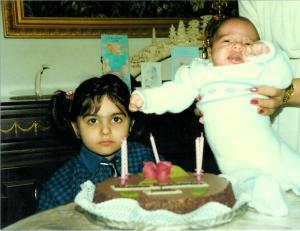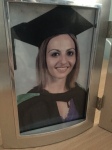Trauma & Addiction…

This picture makes me laugh so much, I was clearly suffering from Middle Child Syndrome – I wasn’t happy that the arrival of my baby brother was over-shadowing my 5th birthday.
Recently I completed my studies in Counselling with no intention of working as a counsellor. Weird I know…
Someone once asked me if I was addicted to studying. I’m not, or maybe I am. I actually enjoy learning, meeting new people and having shared thoughts. But I also like the brain stimulation, the stress of deadlines, the amazing feeling when I handed in an assignment. By the way, I don’t pretend to be in any way cool….
Truthfully, I started my degree in Early Childhood for a number of reasons – there is a ‘joke’ – or perhaps it is more of an understanding, that we become Early Childhood Educators because we ourselves missed out on a childhood.

Bachelor of ECT – 2004
I finished my undergraduate degree in Early Childhood and was and always will be incredibly passionate about child development. I then completed a postgrad specialising in Early Childhood Education, followed by my Masters specialising in the Early Childhood and the Multicultural classroom. I wanted to start a doctorate, but by that stage child development was not as strong a focus for me. Besides, I think my mum was done trying to find a place for the framed pictures and degrees at her place.
The reason I enrolled in the Counselling degree was due to having several people in my life with addictions. I honestly did not understand why and how someone could voluntarily want to get high, drink, gamble, smoke so excessively to the point it could destroy the relationships around them. To give up one of those things was harder than fighting for those that you cared about.
That line. Can I just say has brought me to tears. I have just had a flash of those people I had to say goodbye to over the years. It took me a very long time, I am talking years for me to understand that while felt I was supporting these people through their tough times, I was actually enabling them. I was, in their heads, accepting of their addictions.
When I first moved to Japan, as incredible and exciting experience as it was, the first year away was also my loneliest, I had also come out of a 3 year relationship and I thought by moving overseas this would help – of course it did not, and I found myself studying to fill that void as best as I could.

Postgraduate in Education – 2006
I started working as a consultant in the EC field and met an amazing group of professionals who all shared an incredible amount of knowledge, but I also found we had different strengths when it came to creating an inclusive Early Childhood program.
Through my caseload, I began to read many different reports and assessments on children with additional needs. It was here that I began to see some links with high needs children with challenging behaviour where one or both of the parents had history of trauma either with themselves or in the family. I then began to see the future links with trauma in Early Childhood and on-going issues in adult life, especially with mental illness and addictions. For this reason I wanted to go beyond reading a variety of articles and learn more at university, so I began studying again!
Note, I am not a psychologist, I am not a counsellor, the information I have found is based on research that I found beneficial to answering some of my questions. I understand that some people may not agree with my views, however I do believe the trauma that can occur in the early years can be supported – and hopefully allow a child to continue being a child.

Postgraduate in Counselling – 2016
I found the information to be incredibly intriguing as to the links between trauma and supporting a child’s well-being through this time. This is where the importance of Circle of Security comes into play.
What is trauma?
I think this article from KidsMatter explains Trauma in the Early Years clearly “it is important to remember that trauma is not the event but the reaction to the event“. The response to the event will vary from person to person, child to child. The effects on the individual will also depend on the reaction to the response. For example, if the response is prolonged, this can embed the trauma and therefore become long-term trauma or lead to post-traumatic stress disorder.
Supporting Trauma:
The best way to support a child through trauma is to ensure that the child is safe and genuinely feels safe. It is also important to talk through the what has happened, what is happening and to label the emotions. I refer to Circle of Security. The program is nothing revolutionary and is the basis of everything we know and understand in Early Childhood.
An Example:
A few years ago I taught a 4 year old who despite being in child care from 6 weeks, without fail she would cry at drop off and separation from mum and dad was difficult for everyone involved. When the child – let’s call her Ellie started at my centre, I was immediately told by the parents this information. I encouraged prior orientation, and Ellie became very familiar with myself and the other educators. Within a few weeks, Ellie had settled really well, there were no tears and she was engaging with peers and thriving. All seemed perfect…so I thought.
Mum then explained Ellie’s high anxiety over the weekend and on the drive to preschool, none of which was observed at the centre and she never exhibited this with dad either. As we got to know each other better, more information was shared, to which I then learnt Ellie had gone through a very traumatic experience and had been in and out of hospital for the first few years of her life to correct issues with her stomach. On each occasion to the hospital, it was mum who had taken her.
Ellie’s anxiety was embedded responses to the intrusive medical procedures. With the family, we researched and found a wonderful child psychologist who was able to support them and enabled Ellie to work through her emotions.
It is important to recognise that sometimes as an educator or parent this is not an area of expertise, which is why they are child psychologists. Understandably this can be a high cost, however Medicare can support this with the Mental Health Care Plan which can cover all or some of the cost. Mental Health Care Plans can be accessed through your GP who can then refer you to a psychologist.
The Link to Addiction:
It is nothing new to state that childhood trauma can increase the risk of an individual developing an addiction or depression later in life, however there are different studies that also suggest changes in the brain or triggers affecting neural networks.
It makes sense, an addiction increases dopamine and therefore taking away the pain the individual may be feeling. In addition, this is an emotional response – if I am not feeling good right now, what will make me feel good?
This goes back to how we learn to self-regulate.
Here are a couple YouTube videos that explain this much better than I do;
Loving someone with an addiction is exhausting. It can and will break you. The hardest part is letting go and finally understanding that because you care you are continuing to fuel their addiction. By trying to protect them, you are accepting their addictions. But they will continue to lie, manipulate and destroy people around them. Until they seek help they cannot and will not get better. There are amazing support networks out there.
The most difficult part is understanding that the trauma they faced as an innocent child has brought them here, and until they face those demons, they will never change. In the meantime, as educators, as adults we have a voice and we need to protect the children around us.
Recent Comments